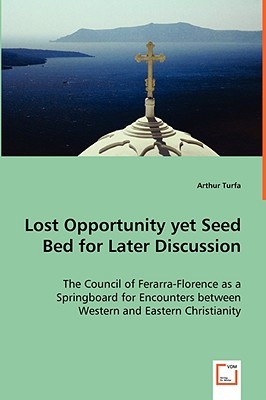
- We will send in 10–14 business days.
- Author: Arthur Turfa
- Publisher: VDM Verlag Dr. Mueller E.K.
- ISBN-10: 3836498774
- ISBN-13: 9783836498777
- Format: 15.2 x 22.9 x 1.1 cm, softcover
- Language: English
- SAVE -10% with code: EXTRA
Lost Opportunity yet Seed Bed for Later Discussion - The Council of Ferarra-Florence as a Springboard for Encounters between Western and Eastern Christianity (e-book) (used book) | bookbook.eu
Reviews
Description
Christianity¿s East-West split lasts to this day. Both halves of the Church drifted apart prior to the Great Schism of 1054. Poor communication, personality conflicts, few theologians conversant in both Latin and Greek as well as political tensions contributed to the division and thwarted reconciliation attempts. The Filioque, use of azymes, papal supremacy, and purgatory were the most contentious issues. A weak Byzantine Empire struggled and failed to secure Western military assistance. Lutherans saw Orthodoxy as a purer form of Christianity. In the 1570s, Tübingen Lutherans contacted Jeremias II. He sought to establish ties with a non-papal Church in the West. The contacts addressed the four issues inherited from Ferrara-Florence ¿ and more. Modern Lutheran-Orthodox dialogue has had some success. The Evangelical Lutheran Church in America and the Standing Committee of Orthodox Bishops in America adopted the 1998 Lutheran-Orthodox Common Statement on Faith in the Holy Trinity, allowing use of the original Nicene Creed in ecumenical and Lutheran services Convening an ecumenical council is nearly impossible; but the gap between East and West could be narrowed.
EXTRA 10 % discount with code: EXTRA
The promotion ends in 19d.20:38:06
The discount code is valid when purchasing from 10 €. Discounts do not stack.
- Author: Arthur Turfa
- Publisher: VDM Verlag Dr. Mueller E.K.
- ISBN-10: 3836498774
- ISBN-13: 9783836498777
- Format: 15.2 x 22.9 x 1.1 cm, softcover
- Language: English English
Christianity¿s East-West split lasts to this day. Both halves of the Church drifted apart prior to the Great Schism of 1054. Poor communication, personality conflicts, few theologians conversant in both Latin and Greek as well as political tensions contributed to the division and thwarted reconciliation attempts. The Filioque, use of azymes, papal supremacy, and purgatory were the most contentious issues. A weak Byzantine Empire struggled and failed to secure Western military assistance. Lutherans saw Orthodoxy as a purer form of Christianity. In the 1570s, Tübingen Lutherans contacted Jeremias II. He sought to establish ties with a non-papal Church in the West. The contacts addressed the four issues inherited from Ferrara-Florence ¿ and more. Modern Lutheran-Orthodox dialogue has had some success. The Evangelical Lutheran Church in America and the Standing Committee of Orthodox Bishops in America adopted the 1998 Lutheran-Orthodox Common Statement on Faith in the Holy Trinity, allowing use of the original Nicene Creed in ecumenical and Lutheran services Convening an ecumenical council is nearly impossible; but the gap between East and West could be narrowed.


Reviews